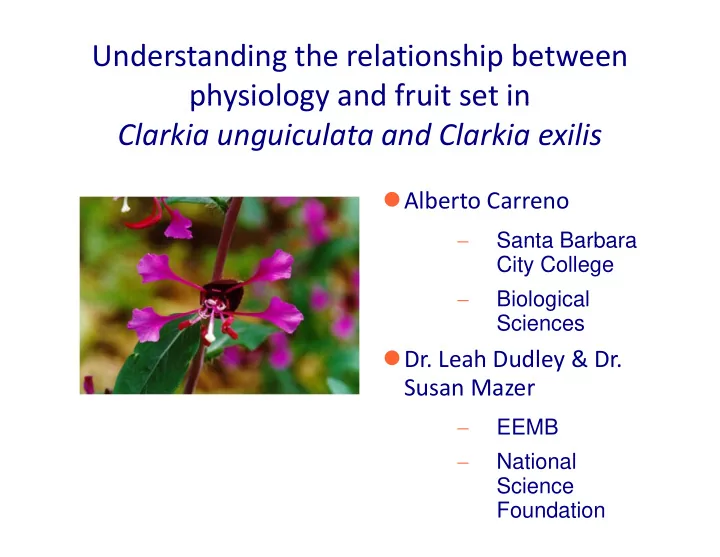

Understanding the relationship between physiology and fruit set in physiology and fruit set in Clarkia unguiculata and Clarkia exilis Alberto Carreno Santa Barbara Santa Barbara City College Biological Sciences Dr. Leah Dudley & Dr. S Susan Mazer M EEMB N National i l Science Foundation
Clarkia unguiculata Clarkia exilis
Clarkia unguiculata :Outcrosser Clarkia unguiculata :Outcrosser
Clarkia exilis :Selfer Clarkia exilis :Selfer
Clarkia unguiculata :Outcrosser Clarkia exilis :Selfer
What we know What we know These plants are regularly exposed to High temperatures High temperatures YEARLY DROUGHT!!! Outcrossers flower in early summer Outcrossers flower in early summer Water is a limiting factor Selfing plants flower sooner than outcrossers Water is NOT a limiting factor g
Hypothesis Outcrossers will exhibit Selfers will exhibit increased reproductive increased reproductive fitness with high water ‐ fitness with low water ‐ use efficiency use efficiency
Physiological Rates Physiological Rates Water Use Efficiency= Photosynthetic Rate T Transpiration Rate i i R Photosynthesis = Process by which carbon is gained Photosynthesis Process by which carbon is gained Transpiration = Plant water loss
Reproductive Fitness= capability of producing fertile offspring Fruit Set= # Fruits # Flowers # Flowers
Populations
Field Work Visited 4 sites containing C.unguiculata • and 2 sites containing C.e xilis Gather physiological data of plants (before Gather physiological data of plants (before – flowering and after flowering) Measured carbon gain and water loss Measured carbon gain and water loss • • Measured 90 pre-flowering and 90 flowering • plants per population p p p p Collect “pre-flowering” and “flowering” plants – 60 out of 90 plants were measured for fitness 60 out of 90 plants were measured for fitness • per population
Lab Work Lab Work Quantify Fruit Set • Count # of fruits present in plants – Mature well formed fruits Mature well formed fruits • • Aborted fruits • Count # of nodes present in plants Count # of nodes present in plants –
Lab Work Lab Work • Leaf area measurements – In order to correct the physiological data In order to correct the physiological data
2 way ANOVA Taxa P=0.0001 Stage P=0.0287 1 ) r ‐ 1 plant ‐ 1 s flower ure fruit et (#matu Fruit se Flowering stage C. exilis C. unguiculata Plant phenological stage Taxon
ANCOVA Taxa(Photo) P=0.05 Ce Fruit set=0.79+0.0002(Photo) Cu Fruit set=0.73 ‐ 0.002(Photo) 1 plant ‐ 1 ) ) s flower ‐ ure fruits t (#matu Fruit set C. exilis ‐ selfer C unguiculata outcrosser C. unguiculata ‐ outcrosser Photosynthetic residuals ( μ mol CO 2 m ‐ 2 sec ‐ 1 )
ANCOVA Taxa(Trans)(Stage) P=0.0575 CeP Fruit set= 0.78 ‐ 3.3(Trans) CeF Fruit set ‐ 0.79+1.07(Trans) CuP Fruit set=0.70 ‐ 16.8(Trans) CuF Fruit set=0.75+1.08(Trans) ant ‐ 1 ) wer ‐ 1 pla fruits flo mature f it set (#m C. exilis ‐ selfer C. unguiculata ‐ outcrosser C. unguiculata outcrosser Fru Transpiration residuals (mol H 2 O m ‐ 2 sec ‐ 1 )
ANCOVA Taxa(WUE) P=0.05 Ce Fruit set=0.79+0.03(WUE) Cu Fruit set=0.73 ‐ 0.16(WUE) 1 plant ‐ 1 ) flower ‐ 1 re fruits t (#matu Fruit set C. exilis ‐ selfer C. unguiculata ‐ outcrosser Water use efficiency residuals (mol CO 2 mmol ‐ 1 H 2 O)
Discussion Discussion • For C. exilis, fruit set was affected by F C ili f i ff d b transpiration in pre ‐ flowering plants • Factors other than water ‐ use efficiency are affecting fruit set g • Microhabitats may be affecting results • Results could change if only measuring total number of fruits
Acknowledgments Acknowledgments S Susan Mazer M • Leah Dudley • Alisa Hove • Jens ‐ Uwe Kuhn • Nicholas Arnold • Arica Lubin •
Recommend
More recommend